China Brands, Marketing & Consumers
From Baijiu Latte to DIY Liquor Coffee: China’s Coffee Culture Takes a Shot at Coffee + Alcohol Fusion
The recent buzz surrounding the Luckin x Maotai collaboration shows that blending coffee + alcohol might just become the next major trend in Chinese coffee culture.
Published
11 months agoon
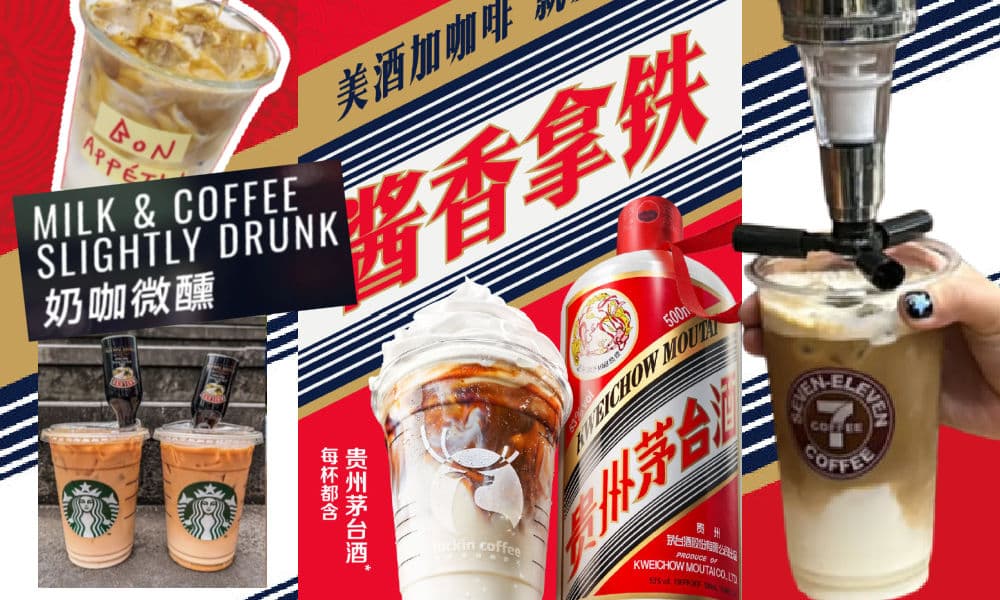
PREMIUM CONTENT
China’s coffee culture is brewing up something new as it embraces the fusion of coffee and alcohol. This blossoming trend, currently a hot topic online thanks to the Luckin x Maotai collaboration, is sparking curiosity and discussions about its lasting impact on coffee culture in China.
Would you like a shot with that? Recently, a trend involving the fusion of alcohol and coffee seems to be taking off in China, blending established liquor brands with popular domestic coffee labels.
The concept of mixing alcohol with coffee is relatively new in China, where classics like Irish Coffee never achieved the same recognition as they did in Western countries.
But also, the way in which ‘coffee + alcohol’ is introduced to consumers is different, with brands such as 7-Eleven and Luckin promoting their ‘coffee + liquor shot’ or ‘alcohol lattes.’
As a tea drinking nation, coffee culture is not part of Chinese traditional culture. However, over the past decade, China has witnessed the remarkable growth of a distinct and immensely popular Chinese coffee culture. In this evolving landscape, companies and consumers are continuously finding innovative ways to incorporate coffee into daily city life.
Coffee in China is typically an out-of-home purchase, particularly favored by the middle class (Ferreira & Ferreira 2018, 785). It has become intrinsically linked with modern urban life in China, taking on new cultural meanings related to status, lifestyle, aesthetics, urban communities, and the acquisition of new tastes. Millennials and Gen Z are at the forefront of shaping China’s coffee culture.
The pursuit of unique flavors is a defining aspect of China’s coffee culture, with a strong emphasis on specialty coffee. In fact, Shanghai alone boasts over 7,000 independent coffee houses, surpassing coffee hubs like London or New York (Xu & Ng 2022, 2349). Chinese coffee shops are known for introducing innovative concepts such as fruit-infused coffee, spicy chili coffee, garlic coffee, and liquor-flavored coffees.
Rather than introducing coffee into China’s drinking culture, alcohol is now being integrated into China’s coffee culture, providing consumers with yet another way to enjoy their coffee and explore new flavor experiences.
7-Eleven Blending Coffee with Alcohol
At various 7-Eleven convenience stores in China, you can now purchase a shot of alcohol to go with your coffee. For just 5 yuan ($0.70), customers can add a shot of their preferred liquor, such as Havana or Malibu, to their take-away coffee. It’s also possible to add it to your soda.
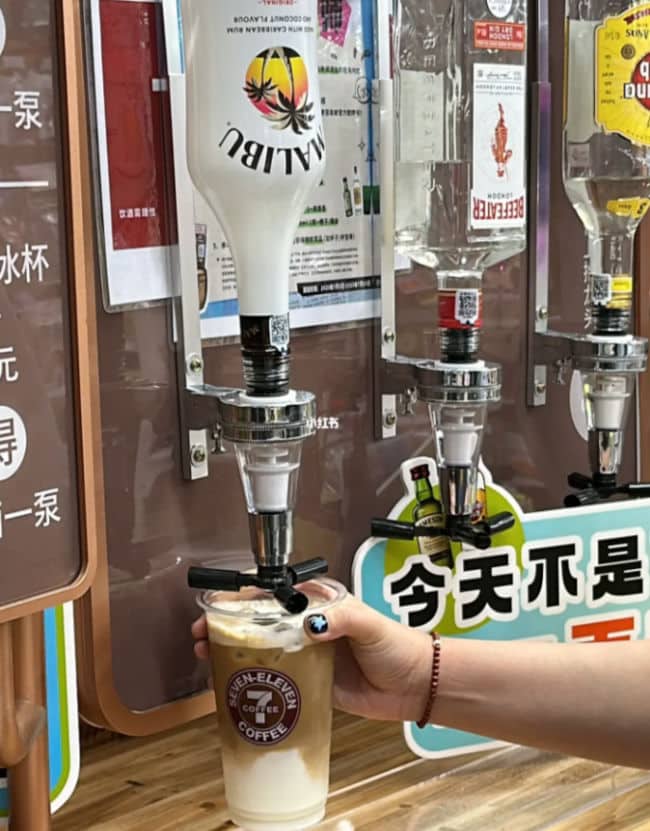
7-Eleven DIY counter: adding a shot of Malibu to takeaway coffee. (Image via Xiaohongshu user 今天怎么还没睡).
While we first noticed this option at a Beijing 7-eleven somewhere during the summer of 2023, Radii and Phoenix News reported that the first DYI counter was piloted at a Beijing store in October of 2022.
The counter, that specifically promotes the coffee + alcohol combo, is meant to serve customers who would previously purchase their coffee and then separately buy a full-priced mini bottle of liquor for anywhere in between 20-40 yuan ($2.75-$5.50) for 50ml.
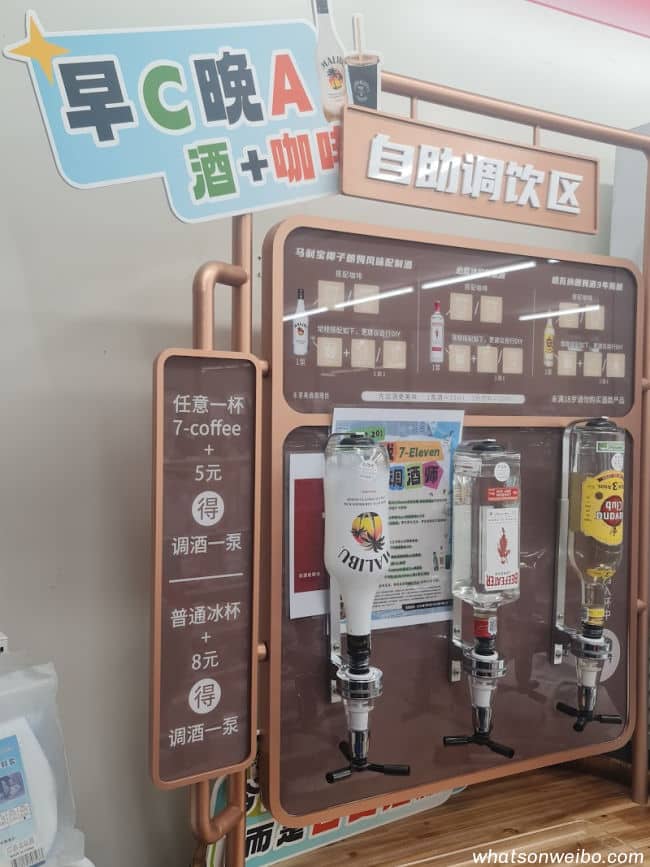
DIY liquor counter at 7-Eleven in Beijing, promoting its “coffee + shot of alcohol” option (Photo by What’s on Weibo).
In late 2022, 7-Eleven in Taiwan also promoted the liquor + coffee combo as it exclusively offered the Hennessy cognac x City Prima coffee “Liquor Latte Set.”
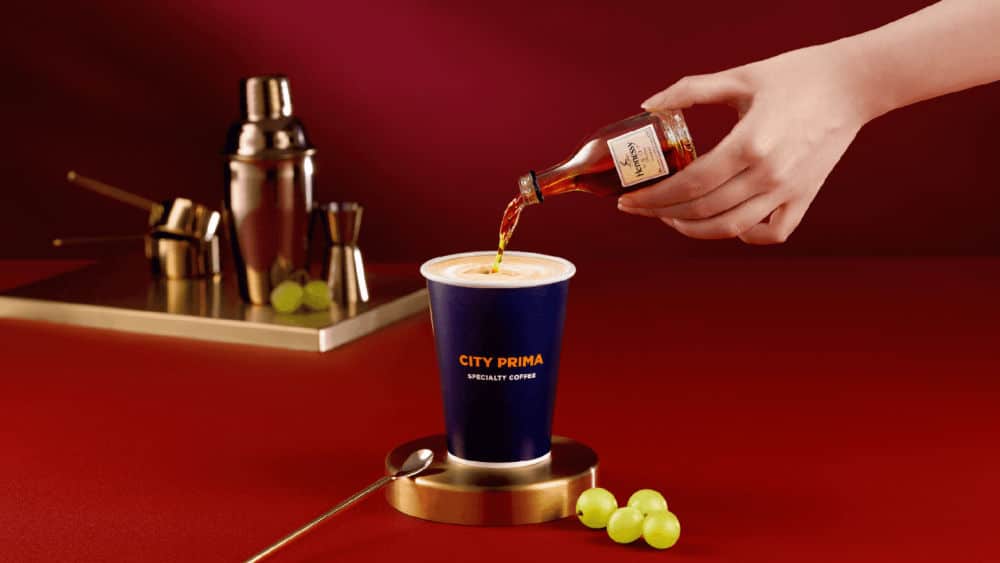
City Prima x Hennessy at 7-Eleven Taiwan (Image via tw.com).
Luckin x Maotai Collab: Introducing Baijiu Latte
While the trend of adding alcohol to coffee seems to be taking off in China, Luckin coffee became all the talk on Chinese social media this week for its collaboration with Maotai (茅台), also known as Moutai, a renowned Chinese brand of baijiu – a type of strong distilled liquor.
Luckin launched the drink on Monday for 38 yuan ($5.20) under the name “酱香拿铁” (jiàng xiāng ná tiě) or “Sauce-Flavored Latte,” soon selling out at various stores and becoming a trending topic online. The ‘sauce’ reference is because of the distinct flavor profile associated with Maotai, often described as having a soy sauce-like aroma (“酱香型”).
The collaboration has become super popular for various reasons, one major one being the unexpected yet exciting combination of two such well-known Chinese brands coming together.
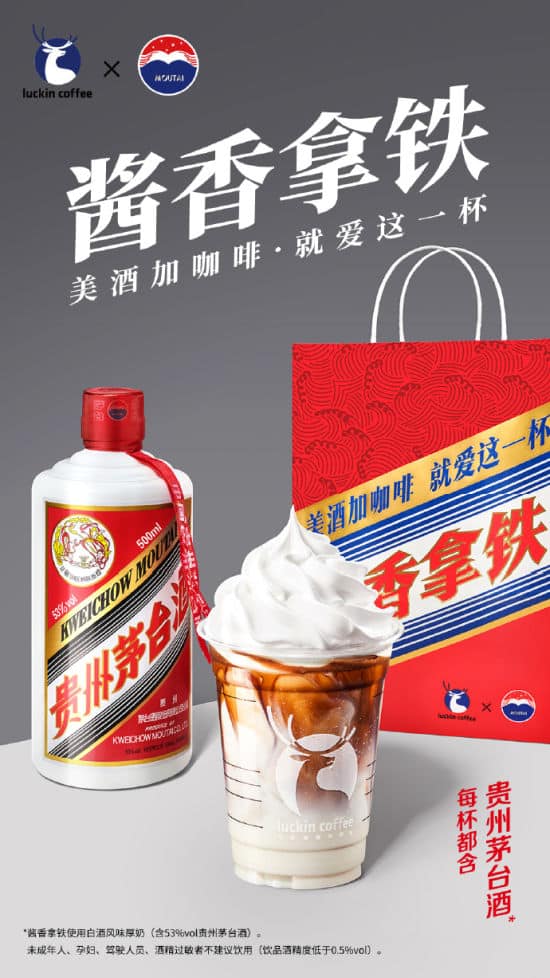
Promotion of the Maotai coffee on Luckin’s Weibo page.
Luckin Coffee (瑞幸咖啡) was founded in Beijing in 2017, opened its first shops in early 2018, and it has seen incredible growth over the past five years. The brand’s primary emphasis lies in providing top-notch coffee at accessible prices in convenient locations. Due to its ubiquity and dominant position in the market, it’s sometimes also referred to as “China’s Starbucks” (“中国星巴克”).
Maotai, made in Maotai in Guizhou Province, prides itself for its 2000-year history and it became the first Chinese liquor to be produced in large-scale production. The strong luxury spirit (53%), known as China’s national liquor, is especially popular among middle-aged and elderly men.
With Luckin being particular popular among China’s younger generations, while Maotai is especially loved among the elder generations, one popular Weibo post about the recent collaboration said: “For young people, it’s their first cup of Maotai, for the elderly, it’s their first cup of Luckin.”
It is also one of the reasons why the trend has become so big this week: many consumers are just curious to try this novel combination, although not everyone likes its special taste.
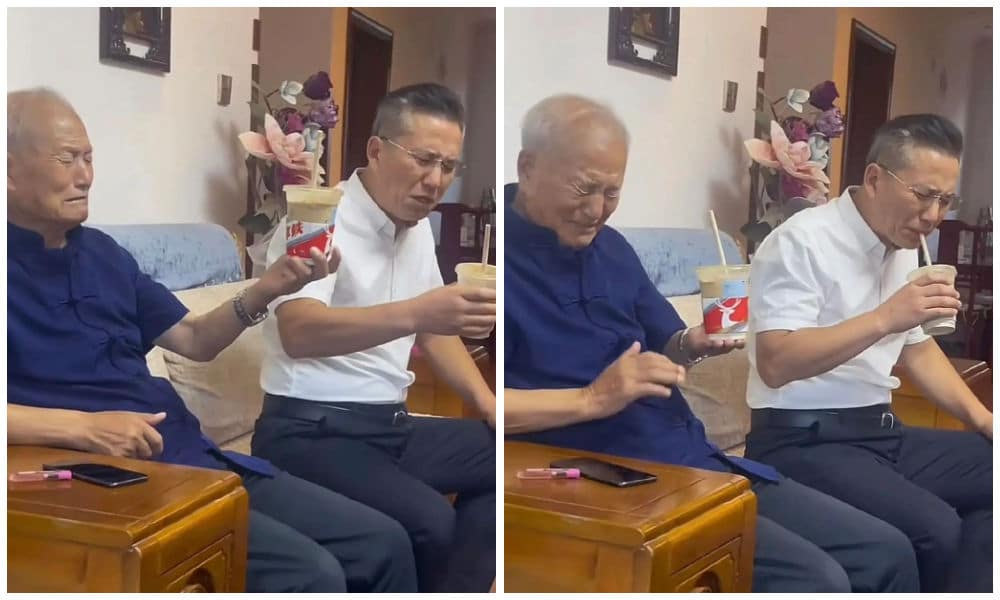
Trying out the new Luckin x Maotai combo (photos via @互联网欢乐指南).
The blend of coffee with alcohol is really more about the flavor than the buzz; the baijiu-flavored Luckin coffee only has an alcohol content of about 0.5%. One Weibo hashtag related to the question of whether or not people should drive after consuming the drink amassed an astonishing 640 million views (#瑞幸回应喝茅台联名咖啡能否开车#). Despite the very low alcohol content, Luckin still advises that minors, pregnant women, and drivers should avoid consuming the beverage.
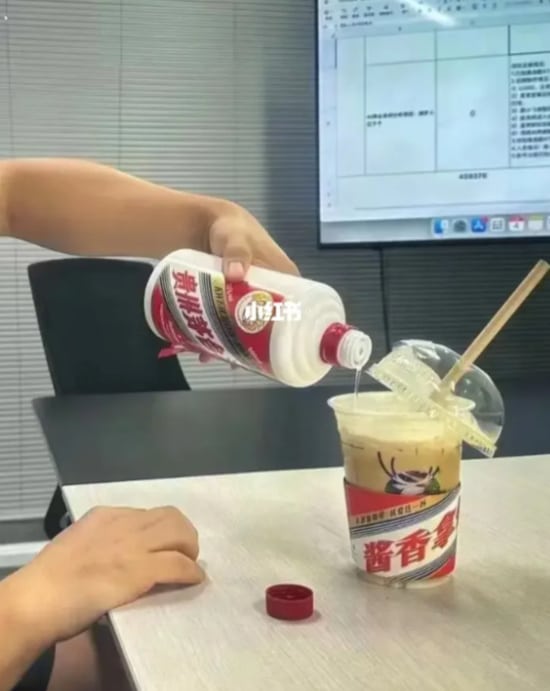
The “Chinese version of Irish Coffee,” image on Xiaohongshu via @謝琦鈦.
Some social media users add some extra Maotai to their coffee themselves, calling it the “Chinese version of Irish coffe” (“中国版的爱尔兰咖啡”).
“Milk Tea for Grown-Ups”
Luckin is not the only Chinese coffee house offering a Maotai-flavored latte. Other Chinese coffee shops have independently introduced their own versions of Maotai coffee, without official partnerships.
In addition to company-driven innovations, consumers are also experimenting with their own coffee + liquor blends. On the social media platform Xiaohongshu, numerous users are enthusiastically sharing their personalized methods infusing coffee with Maotai and various other types of alcohol, including adding miniature bottles of Baileys to Starbucks takeaway coffee.
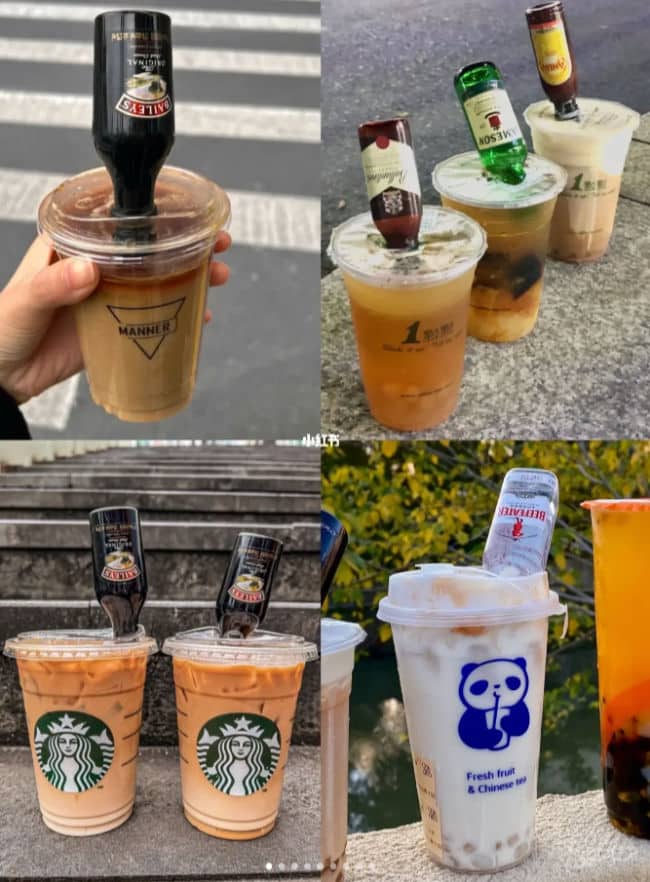
Image via Xiaohongshu user @潮流情报官.
Others are going beyond the coffee trend, and mix their milk tea or fruit tea with Jameson, Kahlua, or other liquors, turning them into “grown-up milk tea” beverages (成年人的奶茶).
While such practices might receive disapproval in many countries, where daytime drinking and adding spirits to coffee could be seen as indicative of alcoholism and irresponsible behavior, in China, these actions generally lack these negative connotations. Many young people just view it as an innovative way to enjoy new tastes, describing it as “a new trendy way to drink coffee” (or tea).
Is the coffee + alcohol mix a temporary trend, or will it become a permanent part of China’s out-of-home coffee culture? On social media, most people are curious to try it out but they are also not convinced the combination is one to stay.
“I don’t really know the flavor of coffee + alcohol, but judging from their effects – alcohol makes me sleepy and coffee wakes me up – I’m afraid it would mix up my nerves, so I don’t dare to try” one commenter (@无边桃炎) wrote.
“It’s just the taste [of mixing coffee with alcohol] that’s really good – apart from the Maotai Luckin one,” one person responded.
They are not alone; numerous young Chinese internet users are speculating that the recent Luckin collaboration is Maotai’s strategy to appeal to China’s younger generations, who do not necessarily appreciate its distinct flavor. These younger demographics have moved away from the traditional drinking culture in which baijiu plays a significant role.
“It’s just so unpleasant to drink,” others write. “Is it alcohol or is it coffee?” another person wonders: “In the end, it’s actually neither.”
While Luckin’s “Sauce-Flavored Latte” might not secure a permanent place on its menu, it’s clear that the trend of adding alcohol to coffee has gained popularity among China’s younger consumers. With 7-Eleven’s DIY counter offering a variety of sweeter liquors for customers to blend with their coffee, it appears they’ve found the perfect “shot” in this coffee and liquor trend.
By Manya Koetse
with contributions by Miranda Barnes
References
Ferreira, Jennifer, and Carlos Ferreira. 2018. “Challenges and Opportunities of New Retail Horizons in Emerging Markets: The Case of a Rising Coffee Culture in China.” Business Horizons 61, no. 5: 783-796.
Xu, Xinyue, and Aaron Yikai Ng. 2023. “Cultivation of New Taste: Taste Makers and New Forms of Distinction in China’s Coffee Culture.” Information, Communication & Society 26, no. 11: 2345-2362.
Get the story behind the hashtag. Subscribe to What’s on Weibo here to receive our newsletter and get access to our latest articles:
Spotted a mistake or want to add something? Please let us know in comments below or email us. First-time commenters, please be patient – we will have to manually approve your comment before it appears.
©2023 Whatsonweibo. All rights reserved. Do not reproduce our content without permission – you can contact us at info@whatsonweibo.com.
Manya Koetse is the founder and editor-in-chief of whatsonweibo.com. She is a writer, public speaker, and researcher (Sinologist, MPhil) on social trends, digital developments, and new media in an ever-changing China, with a focus on Chinese society, pop culture, and gender issues. She shares her love for hotpot on hotpotambassador.com. Contact at manya@whatsonweibo.com, or follow on Twitter.

Also Read
China Books & Literature
Why Chinese Publishers Are Boycotting the 618 Shopping Festival
Bookworms love to get a good deal on books, but when the deals are too good, it can actually harm the publishing industry.
Published
2 months agoon
June 8, 2024By
Ruixin Zhang
JD.com’s 618 shopping festival is driving down book prices to such an extent that it has prompted a boycott by Chinese publishers, who are concerned about the financial sustainability of their industry.
When June begins, promotional campaigns for China’s 618 Online Shopping Festival suddenly appear everywhere—it’s hard to ignore.
The 618 Festival is a product of China’s booming e-commerce culture. Taking place annually on June 18th, it is China’s largest mid-year shopping carnival. While Alibaba’s “Singles’ Day” shopping festival has been taking place on November 11th since 2009, the 618 Festival was launched by another Chinese e-commerce giant, JD.com (京东), to celebrate the company’s anniversary, boost its sales, and increase its brand value.
By now, other e-commerce platforms such as Taobao and Pinduoduo have joined the 618 Festival, and it has turned into another major nationwide shopping spree event.
For many book lovers in China, 618 has become the perfect opportunity to stock up on books. In previous years, e-commerce platforms like JD.com and Dangdang (当当) would roll out tempting offers during the festival, such as “300 RMB ($41) off for every 500 RMB ($69) spent” or “50 RMB ($7) off for every 100 RMB ($13.8) spent.”
Starting in May, about a month before 618, the largest bookworm community group on the Douban platform, nicknamed “Buying Like Landsliding, Reading Like Silk Spinning” (买书如山倒,看书如抽丝), would start buzzing with activity, discussing book sales, comparing shopping lists, or sharing views about different issues.

Social media users share lists of which books to buy during the 618 shopping festivities.
This year, however, the mood within the group was different. Many members posted that before the 618 season began, books from various publishers were suddenly taken down from e-commerce platforms, disappearing from their online shopping carts. This unusual occurrence sparked discussions among book lovers, with speculations arising about a potential conflict between Chinese publishers and e-commerce platforms.
A joint statement posted in May provided clarity. According to Chinese media outlet The Paper (@澎湃新闻), eight publishers in Beijing and the Shanghai Publishing and Distribution Association, which represent 46 publishing units in Shanghai, issued a statement indicating they refuse to participate in this year’s 618 promotional campaign as proposed by JD.com.
The collective industry boycott has a clear motivation: during JD’s 618 promotional campaign, which offers all books at steep discounts (e.g., 60-70% off) for eight days, publishers lose money on each book sold. Meanwhile, JD.com continues to profit by forcing publishers to sell books at significantly reduced prices (e.g., 80% off). For many publishers, it is simply not sustainable to sell books at 20% of the original price.
One person who has openly spoken out against JD.com’s practices is Shen Haobo (沈浩波), founder and CEO of Chinese book publisher Motie Group (磨铁集团). Shen shared a post on WeChat Moments on May 31st, stating that Motie has completely stopped shipping to JD.com as it opposes the company’s low-price promotions. Shen said it felt like JD.com is “repeatedly rubbing our faces into the ground.”
Nevertheless, many netizens expressed confusion over the situation. Under the hashtag topic “Multiple Publishers Are Boycotting the 618 Book Promotions” (#多家出版社抵制618图书大促#), people complained about the relatively high cost of physical books.
With a single legitimate copy often costing 50-60 RMB ($7-$8.3), and children’s books often costing much more, many Chinese readers can only afford to buy books during big sales. They question the justification for these rising prices, as books used to be much more affordable.
Book blogger TaoLangGe (@陶朗歌) argues that for ordinary readers in China, the removal of discounted books is not good news. As consumers, most people are not concerned with the “life and death of the publishing industry” and naturally prefer cheaper books.
However, industry insiders argue that a “price war” on books may not truly benefit buyers in the end, as it is actually driving up the prices as a forced response to the frequent discount promotions by e-commerce platforms.
China News (@中国新闻网) interviewed publisher San Shi (三石), who noted that people’s expectations of book prices can be easily influenced by promotional activities, leading to a subconscious belief that purchasing books at such low prices is normal. Publishers, therefore, feel compelled to reduce costs and adopt price competition to attract buyers. However, the space for cost reduction in paper and printing is limited.
Eventually, this pressure could affect the quality and layout of books, including their binding, design, and editing. In the long run, if a vicious cycle develops, it would be detrimental to the production and publication of high-quality books, ultimately disappointing book lovers who will struggle to find the books they want, in the format they prefer.
This debate temporarily resolved with JD.com’s compromise. According to The Paper, JD.com has started to abandon its previous strategy of offering extreme discounts across all book categories. Publishers now have a certain degree of autonomy, able to decide the types of books and discount rates for platform promotions.
While most previously delisted books have returned for sale, JD.com’s silence on their official social media channels leaves people worried about the future of China’s publishing industry in an era dominated by e-commerce platforms, especially at a time when online shops and livestreamers keep competing over who has the best book deals, hyping up promotional campaigns like ‘9.9 RMB ($1.4) per book with free shipping’ to ‘1 RMB ($0.15) books.’
This year’s developments surrounding the publishing industry and 618 has led to some discussions that have created more awareness among Chinese consumers about the true price of books. “I was planning to bulk buy books this year,” one commenter wrote: “But then I looked at my bookshelf and saw that some of last year’s books haven’t even been unwrapped yet.”
Another commenter wrote: “Although I’m just an ordinary reader, I still feel very sad about this situation. It’s reasonable to say that lower prices are good for readers, but what I see is an unfavorable outlook for publishers and the book market. If this continues, no one will want to work in this industry, and for readers who do not like e-books and only prefer physical books, this is definitely not a good thing at all!”
By Ruixin Zhang, edited with further input by Manya Koetse
Independently reporting China trends for over a decade. Like what we do? Support us and get the story behind the hashtag by subscribing:
Spotted a mistake or want to add something? Please let us know in comments below or email us. First-time commenters, please be patient – we will have to manually approve your comment before it appears.
©2024 Whatsonweibo. All rights reserved. Do not reproduce our content without permission – you can contact us at info@whatsonweibo.com.
China Brands, Marketing & Consumers
Chinese Sun Protection Fashion: Move over Facekini, Here’s the Peek-a-Boo Polo
From facekini to no-face hoodie: China’s anti-tan fashion continues to evolve.
Published
2 months agoon
June 6, 2024
It has been ten years since the Chinese “facekini”—a head garment worn by Chinese ‘aunties’ at the beach or swimming pool to prevent sunburn—went international.
Although the facekini’s debut in French fashion magazines did not lead to an international craze, it did turn the term “facekini” (脸基尼), coined in 2012, into an internationally recognized word.
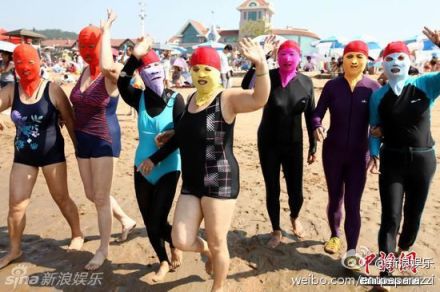
The facekini went viral in 2014.
In recent years, China has seen a rise in anti-tan, sun-protection garments. More than just preventing sunburn, these garments aim to prevent any tanning at all, helping Chinese women—and some men—maintain as pale a complexion as possible, as fair skin is deemed aesthetically ideal.
As temperatures are soaring across China, online fashion stores on Taobao and other platforms are offering all kinds of fashion solutions to prevent the skin, mainly the face, from being exposed to the sun.

One of these solutions is the reversed no-face sun protection hoodie, or the ‘peek-a-boo polo,’ a dress shirt with a reverse hoodie featuring eye holes and a zipper for the mouth area.

This sun-protective garment is available in various sizes and models, with some inspired by or made by the Japanese NOTHOMME brand. These garments can be worn in two ways—hoodie front or hoodie back. Prices range from 100 to 280 yuan ($13-$38) per shirt/jacket.

The no-face hoodie sun protection shirt is sold in various colors and variations on Chinese e-commerce sites.
Some shops on Taobao joke about the extreme sun-protective fashion, writing: “During the day, you don’t know which one is your wife. At night they’ll return to normal and you’ll see it’s your wife.”

On Xiaohongshu, fashion commenters note how Chinese sun protective clothing has become more extreme over the past few years, with “sunburn protection warriors” (防晒战士) thinking of all kinds of solutions to avoid a tan.

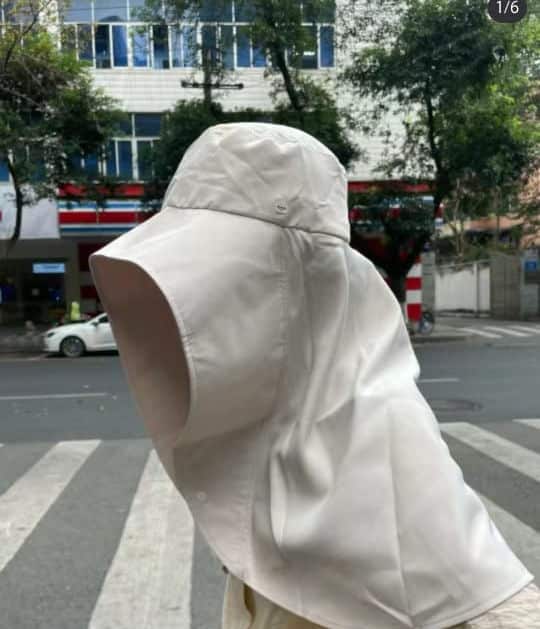


Although there are many jokes surrounding China’s “sun protection warriors,” some people believe they are taking it too far, even comparing them to Muslim women dressed in burqas.
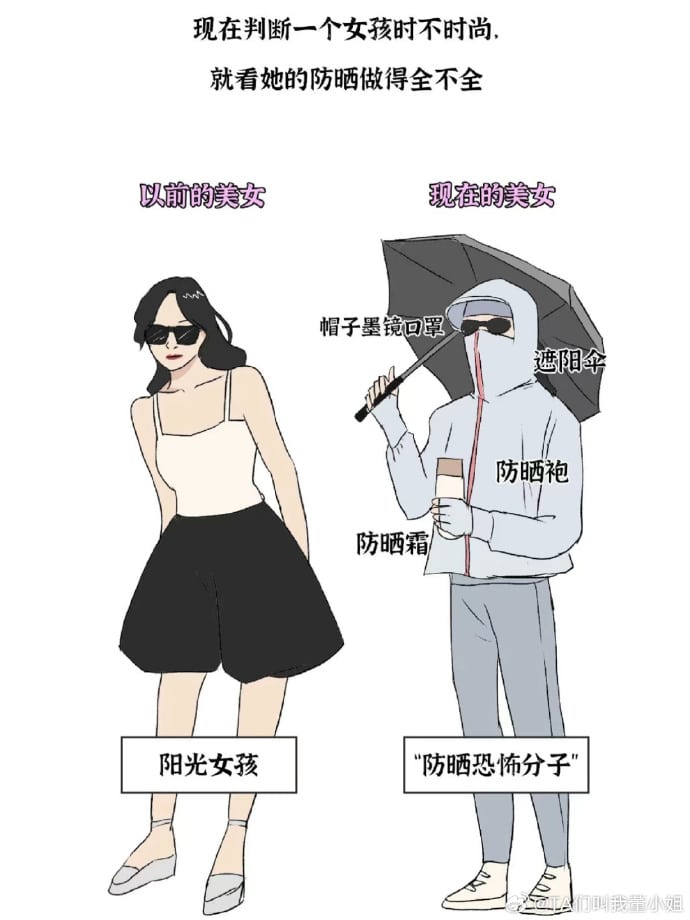
Image shared on Weibo by @TA们叫我董小姐, comparing pretty girls before (left) and nowadays (right), also labeled “sunscreen terrorists.”
Some Xiaohongshu influencers argue that instead of wrapping themselves up like mummies, people should pay more attention to the UV index, suggesting that applying sunscreen and using a parasol or hat usually offers enough protection.
By Manya Koetse, with contributions by Miranda Barnes
Spotted a mistake or want to add something? Please let us know in comments below or email us. First-time commenters, please be patient – we will have to manually approve your comment before it appears.
©2024 Whatsonweibo. All rights reserved. Do not reproduce our content without permission – you can contact us at info@whatsonweibo.com.
Subscribe

Weibo Watch: The Future is Here

“Bye Bye Biden”: Biden’s Many Nicknames in Chinese

Enjoying the ‘Sea’ in Beijing’s Ditan Park

A Triumph for “Comrade Trump”: Chinese Social Media Reactions to Trump Rally Shooting

Weibo Watch: Get Up, Stand Up

The Tragic Story of “Fat Cat”: How a Chinese Gamer’s Suicide Went Viral

“Old Bull Eating Young Grass”: 86-Year-Old Chinese Painter Fan Zeng Marries 36-Year-Old Xu Meng

A Brew of Controversy: Lu Xun and LELECHA’s ‘Smoky’ Oolong Tea

Singing Competition or Patriotic Fight? Hunan TV’s ‘Singer 2024’ Stirs Nationalistic Sentiments

Zara Dress Goes Viral in China for Resemblance to Haidilao Apron

Weibo Watch: The Battle for the Bottom Bed

About the “AI Chatbot Based on Xi Jinping” Story

China’s Intensified Social Media Propaganda: “Taiwan Must Return to Motherland”

Weibo Watch: Telling China’s Stories Wrong

Saying Goodbye to “Uncle Wang”: Wang Wenbin Becomes Chinese Ambassador to Cambodia
Get in touch
Would you like to become a contributor, or do you have any tips or suggestions? Get in touch here!
Popular Reads
-

 China Insight3 months ago
China Insight3 months agoThe Tragic Story of “Fat Cat”: How a Chinese Gamer’s Suicide Went Viral
-

 China Music4 months ago
China Music4 months agoThe Chinese Viral TikTok Song Explained (No, It’s Not About Samsung)
-

 China Digital10 months ago
China Digital10 months agoToo Sexy for Weibo? Online Discussions on the Concept of ‘Cābiān’
-

 China Arts & Entertainment12 months ago
China Arts & Entertainment12 months agoBehind 8 Billion Streams: Who is Dao Lang Cursing in the Chinese Hit Song ‘Luocha Kingdom’?




